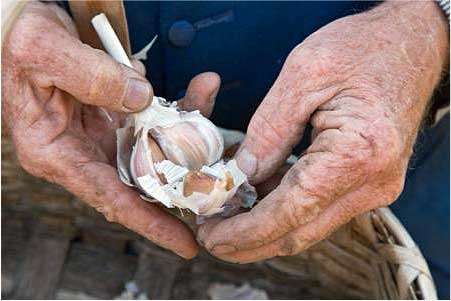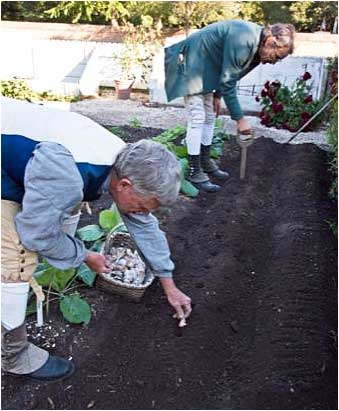
separating garlic cloves
Garlic was seldom admitted to the English table in the 18th century. John Evelyn, a founding member of the Royal Society in England, proclaimed, “Tho’ both . . . Spaniards and Italians, and the more Southern People [eat garlic] with almost everything . . . we absolutely forbid it entrance into our Salleting, by reason of its intolerable Rankness . . . to be sure, ‘tis not for Ladies Palats nor those who court them.” However unpleasant to the English palate, long life has long been attributed to the consumption of garlic. Stephen Switzer testified in 1727, “A gentleman, a neighbor too . . . arrived to near an hundred and twenty years of age, without any other physic, or extraordinary diet, than that of roasted garlick.”
Virginia colonists, like their English cousins, found garlic more useful as a medicinal rather than culinary herb. In Williamsburg the Virginia Gazette recorded in 1773: “A remedy for corns on the feet. ROAST a clove of garlic on a live coal, or in hot ashes; apply it to the corn, and fasten it on with a piece of cloth, the moment of going to bed.” After three of four nights it will “leave the part as clean and smooth as if it had never been attacked with any disorder.”

planting cloves with a dibble
If you should have the misfortune to suffer from corns on the feet, October is the month in which you must plant your garlic. To propagate, break a bulb apart and collect the individual cloves. These are planted, with a dibble, between two and four inches deep (deeper in the northern colonies) in a well-drained soil. We choose to plant our cloves on broad ridges that keep the bulbs dry but provide a reservoir of well watered furrows between. In the southern colonies the foliage will appear in the fall. In the northern-most parts of America, the clove will grow roots but the foliage will not appear until the spring. Garlic is harvested when the leaves decline which we will discuss at the appropriate season.
A complete description of the Allium family may be found in Vegetable Gardening the Colonial Williamsburg Way, 18th Century Methods for Today’s Organic Gardeners (Rodale Press).

Leave a Reply